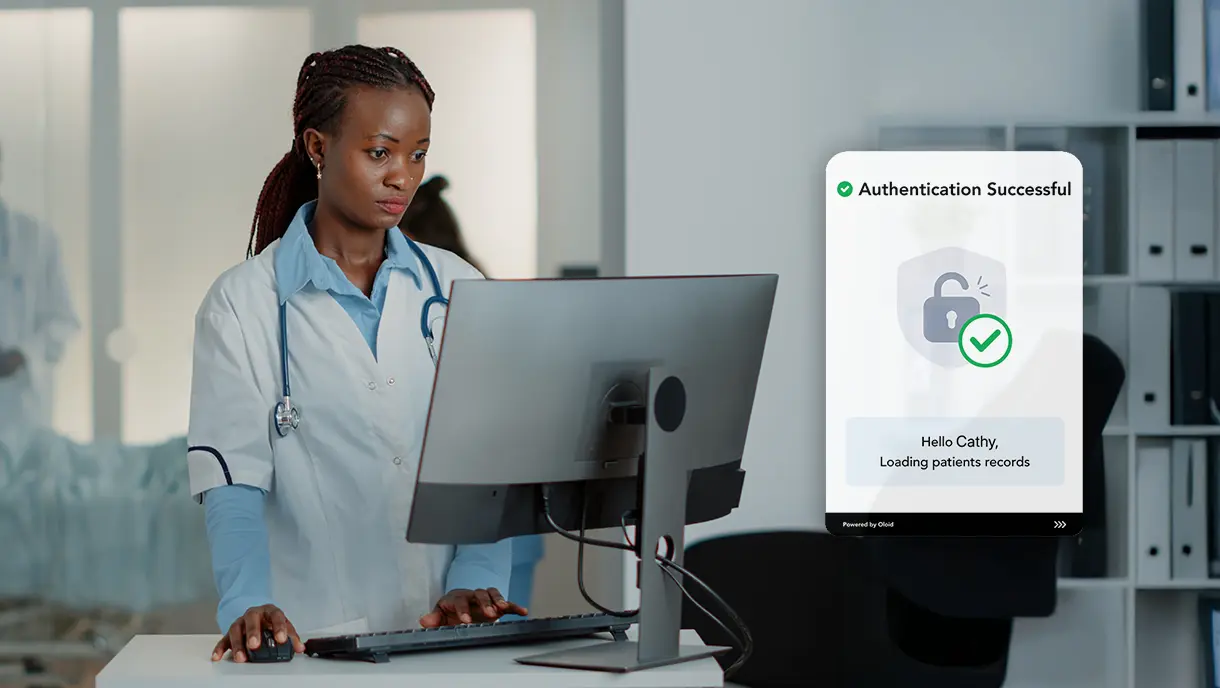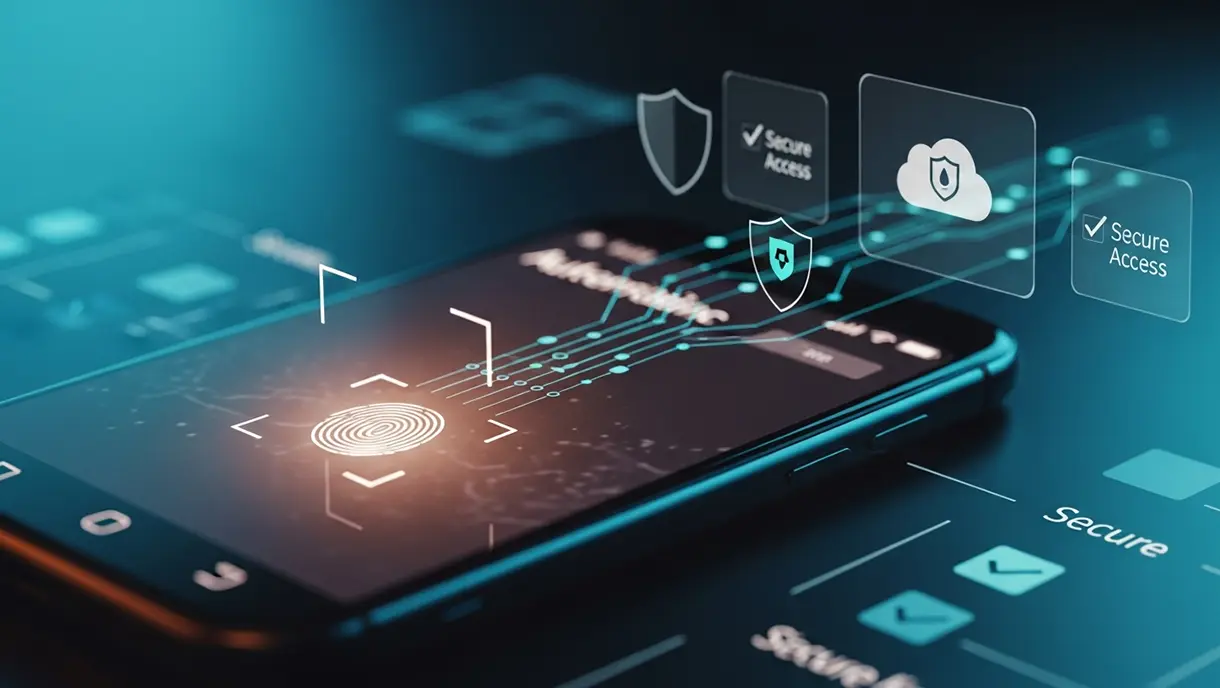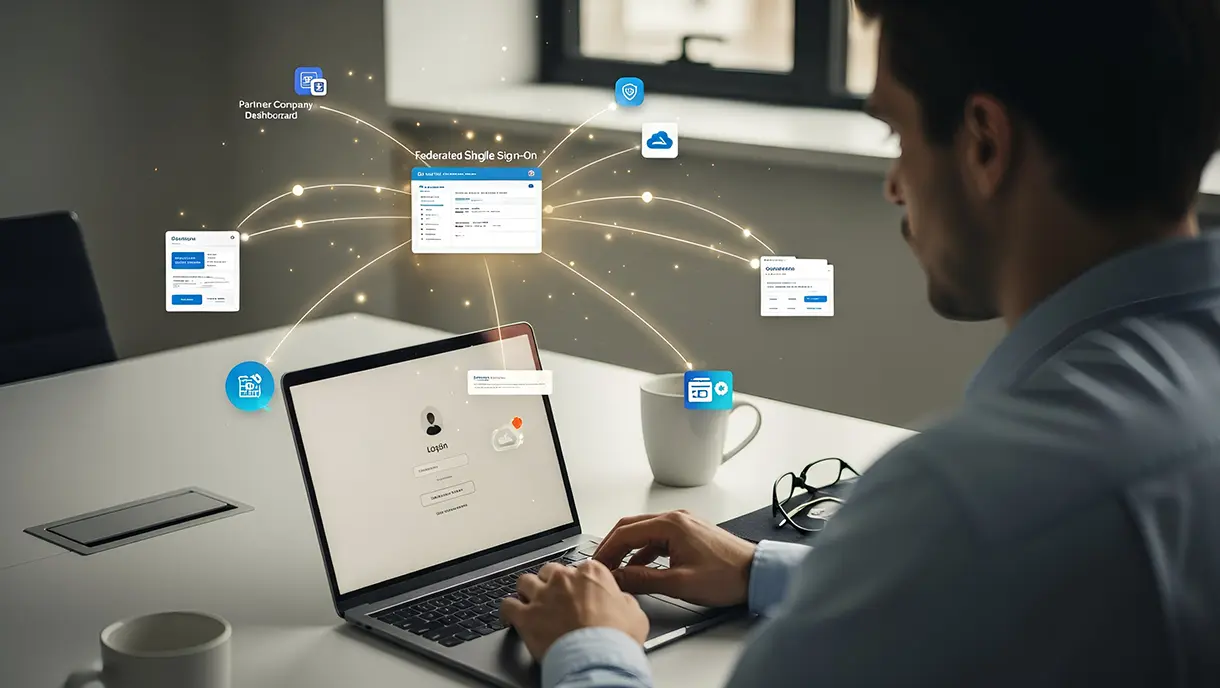SSO for Healthcare: Simplifying Access While Strengthening Security
The write-up explains how Single Sign-On (SSO) simplifies access to multiple healthcare systems, reducing password fatigue, improving clinical efficiency, and strengthening data security. It highlights unique compliance needs, key features of healthcare-focused SSO, implementation best practices, and how OLOID’s passwordless authentication platform enhances security, streamlines workflows, and supports HIPAA and DEA EPCS compliance for modern healthcare environments.

Healthcare workers face a constant struggle with password overload. Every critical system, from electronic health records and imaging platforms to pharmacy databases and scheduling tools, demands its own set of credentials. This endless juggling of logins wastes valuable time, increases the risk of errors, and can delay patient care when every second counts.
Single Sign-On (SSO) for healthcare simplifies this complexity. With a single login, medical staff gain seamless access to all their applications. No more fumbling with passwords during emergencies. No more delays when doctors or nurses need immediate access to patient information.
According to a report by Grand View Research, the global market value for SSO healthcare is projected to increase from USD 443.3 million in 2024 to USD 1,205.2 million by 2030. This hints at a rising preference for Single Sign-On among healthcare organizations.
This blog provides a comprehensive overview of SSO (Single Sign-On) for healthcare, including its benefits, compliance requirements, implementation challenges, and best practices.
What is SSO in Healthcare?
Single Sign-On (SSO) is an authentication method that enables users to access multiple applications using a single set of login credentials. Instead of remembering separate passwords for each system, users authenticate once and gain access to all connected platforms.
In healthcare environments, SSO creates a unified gateway to complex medical applications. When a doctor logs into their workstation, they immediately access electronic health records, laboratory systems, radiology platforms, and administrative tools without additional authentication steps. This eliminates the need to juggle multiple passwords across disconnected healthcare systems.
Healthcare facilities typically run dozens of specialized applications that rarely communicate with each other. Clinical staff may access patient charts, review lab results, check for medication interactions, and document procedures across various platforms. SSO bridges these systems by providing consistent access control across the entire healthcare technology stack.
Difference Between General SSO and Healthcare SSO
Healthcare-focused SSO differs significantly from standard business solutions due to unique medical requirements and regulations. Here’s a clear difference between the two:
Healthcare SSO must handle role-based access that aligns with medical responsibilities while maintaining flexibility for emergencies when patient care takes priority over standard security protocols.
Why Healthcare Organizations Struggle With Authentication
Healthcare providers operate across multiple disconnected systems: EHRs, lab platforms, imaging software, billing tools, and pharmacy databases, each requiring separate logins. This creates authentication silos, forcing staff to juggle numerous passwords in high-pressure environments.
Some of the most common authentication challenges faced by healthcare organizations include:
- Password Overload: Medical staff are required to maintain separate logins across multiple systems, resulting in a significant authentication burden.
- Staff Password Fatigue: Repeated logins across systems lead to unsafe practices like credential reuse and oversimplified passwords.
- Security Vulnerabilities: Weak passwords and credential reuse create entry points for cyberattacks targeting sensitive patient data.
- Emergency Access Delays: Critical patient situations are delayed when staff cannot quickly access necessary medical systems.
- IT Support Burden: Help desk teams spend a significant amount of time on password resets instead of focusing on strategic healthcare technology initiatives.
- Compliance Risks: Poor password practices pose a significant threat to HIPAA compliance and expose organizations to potential regulatory penalties.
- Legacy System Integration: Older healthcare applications cannot connect to modern authentication systems, requiring separate login processes.
These authentication challenges create a costly cycle of inefficiency and risk that demands a comprehensive solution designed specifically for healthcare environments.
Why Healthcare Needs Single Sign-On
Healthcare organizations require authentication solutions that address their unique operational challenges while maintaining the highest security standards. Single Sign-On in healthcare eliminates complex access management challenges that plague medical facilities.
1. Reduces Password Fatigue for Medical Staff
Medical professionals experience significant stress from managing multiple system credentials throughout their workday. Doctors, nurses, and administrative staff must remember multiple passwords for various electronic systems, including electronic health records, laboratory systems, and billing applications. This diverts mental energy away from patient care.
SSO for healthcare eliminates password fatigue by providing one secure authentication process that grants access to all necessary applications. Medical staff log in once at the beginning of their shift and maintain seamless access to all the necessary systems.
2. Improves Clinical Efficiency and Patient Care
The time spent on authentication directly impacts the quality of patient care and clinical efficiency. Emergencies become particularly problematic when healthcare workers cannot quickly access critical patient information due to authentication barriers.
Using SSO for healthcare authentication streamlines clinical workflows by removing authentication delays between systems. Physicians can move fluidly from reviewing lab results to updating patient records without interruption. This improves response times during medical emergencies and allows for more thorough patient consultations.
3. Enhances Data Security and Access Control
Weak passwords and credential reuse create vulnerabilities that hackers exploit to gain unauthorized access to protected health information. Traditional authentication methods often lack the centralized control necessary to maintain consistent security policies across healthcare systems.
Implementing SSO in healthcare organizations enhances healthcare data security and access control by providing centralized authentication and comprehensive access controls. IT teams can enforce strong password policies, implement multi-factor authentication, and maintain detailed audit trails from a single platform.
4. Supports Remote and Multi-Device Access
Modern healthcare delivery requires flexible access to medical systems from various locations and devices. Physicians need to review patient charts from home, while nurses require mobile access to update records at bedside.
SSO for healthcare enables secure remote access while maintaining strict security controls regardless of location or device. Healthcare workers can safely access patient information from approved devices using the same authentication credentials, with security maintained through device recognition and location-based controls.
These combined benefits make SSO an essential component of modern healthcare IT infrastructure. However, while SSO is beneficial for authentication in healthcare, the industry also has specific compliance requirements that SSO procedures must meet.
[[cta]]
SSO and Healthcare Compliance Requirements
Healthcare compliance demands go far beyond standard business security requirements. Medical organizations must comply with strict regulatory frameworks that govern the access, storage, and transmission of patient data.
Single Sign-On solutions designed for healthcare must meet these demanding compliance standards while maintaining the usability that medical staff require.
1. HIPAA-Compliant Authentication
Why HIPAA Compliance Matters
HIPAA requires healthcare organizations to implement strict safeguards for accessing protected health information (PHI). Yet, traditional authentication methods often fall short of meeting their administrative, physical, and technical requirements, putting both patient privacy and organizational compliance at risk.
Key Requirements for Healthcare SSO
- Role-based access controls so staff only view data relevant to their responsibilities
- Automatic session timeouts to prevent unauthorized use
- Robust authentication mechanisms aligned with HIPAA’s “minimum necessary” standard
How It Helps
By combining granular permission controls, encrypted credential transmission, and comprehensive access logging, healthcare-focused SSO solutions ensure secure, role-appropriate access. This balance of security, efficiency, and accountability helps organizations meet HIPAA requirements without slowing down care delivery.
2. DEA EPCS Compliance for e-Prescriptions
Why EPCS Compliance Matters
Controlled substance prescriptions are tightly regulated to prevent misuse and fraud. The DEA’s EPCS framework requires stronger authentication than HIPAA alone, but without careful implementation, these requirements can disrupt clinical workflows and slow down care delivery.
Key Requirements for Healthcare SSO
- Two-factor authentication for controlled substance prescriptions
- Seamless integration of additional security steps into the prescribing process
- Minimal disruption to clinical efficiency and patient care
How It Helps
Healthcare-focused SSO solutions embed multi-factor authentication directly into the sign-on process. When physicians prescribe controlled substances, the system automatically triggers the required extra verification steps, without forcing separate logins or interrupting their workflow.
3. Audit Trails and Access Transparency
Why Audit Trails Matter
Healthcare regulations demand full visibility into how patient information is accessed. Without detailed audit logs, organizations risk compliance violations, weakened security oversight, and gaps in incident response.
Key Requirements for Healthcare SSO
- Comprehensive tracking of all authentication and access events
- Visibility into failed login attempts and privilege escalations
- Integration with compliance monitoring and reporting systems
How It Helps
Healthcare-focused SSO platforms generate detailed logs that capture every user action, from authentication events to access attempts. These audit trails ensure regulatory compliance, strengthen security investigations, and provide the transparency needed for ongoing compliance management.
4. Reducing Risk of Data Breaches
Why It Matters
Healthcare data breaches bring steep financial penalties, mandatory HIPAA breach notifications, OCR investigations, and loss of patient trust. Weak or reused passwords remain the most common entry point for attackers.
Key Requirements for Healthcare SSO
- Centralized access controls to manage all connected systems
- Strong authentication practices that eliminate password reuse
- Rapid incident response with the ability to disable compromised accounts instantly
How It Helps
SSO strengthens healthcare security by removing weak password practices, unifying access under a single management platform, and enabling fast threat containment. This proactive approach reduces breach risks while protecting patient data and organizational reputation.
By addressing these compliance requirements, healthcare-focused SSO solutions create a secure foundation for modern care delivery. With compliance assured, the next step is to evaluate the key features every healthcare SSO solution should have to ensure both security and usability for medical staff.
Key Features Every Healthcare SSO Solution Should Have
Healthcare organizations require SSO solutions with specialized capabilities that address the unique demands of medical environments. Standard business SSO platforms lack the specific features necessary to support complex healthcare workflows, regulatory compliance, and the diverse systems that medical facilities depend on.
Here are the key features you should look for in a healthcare SSO platform to ensure its suitability for your healthcare organization:
1. Role-Based Access Management
- Addresses complex hierarchies in healthcare organizations where different roles require distinct system permissions (e.g., radiologists vs. billing administrators).
- Provides broader access for emergency room physicians compared to outpatient clinic staff.
- Delivers granular, role-based access automatically based on job functions and clinical responsibilities.
- Allows administrators to quickly adjust access levels across all connected systems when staff members change roles.
- Eliminates the need for manual updates when roles change.
2. Multi-Factor Authentication Integration
- Meets DEA EPCS compliance requirements mandating multi-factor authentication for controlled substance prescriptions.
- Supports HIPAA recommendations for additional authentication layers to protect sensitive patient information.
- Integrates seamlessly with a wide range of authentication methods, including smart cards, biometric readers, mobile apps, and hardware tokens.
- Maintains clinical workflow speed and minimizes disruption to medical environments.
3. Compatibility with EHR/EMR Platforms (Epic, Cerner, Allscripts)
- Recognizes that healthcare IT infrastructure is typically built around major EHR platforms such as Epic, Cerner, or Allscripts.
- Makes seamless SSO integration essential for maintaining clinical workflows.
- Provides pre-built integrations with major EHR systems to support specific authentication protocols and security requirements.
- Ensures consistent and reliable user experiences across the healthcare technology stack.
4. Support for Passwordless Authentication
- A healthcare passwordless authentication platform eliminates security vulnerabilities and usability problems associated with traditional passwords.
- Offers faster access to medical systems through modern authentication options, including biometric recognition, smart cards, mobile device authentication, and FIDO2 security keys.
- Reduces login friction for clinical staff.
- Minimizes password-related security risks and lowers IT support burdens.
5. Scalability for Hospitals and Multi-Site Networks
- Supports a wide range of healthcare organizations, from small clinics to large hospital networks spanning multiple states.
- Enables SSO solutions to scale effectively while maintaining consistent security policies.
- Handles thousands of users across multiple locations with centralized policy management.
- Provides local administrative flexibility to accommodate specific operational requirements.
- Ensures consistent security standards organization-wide.
These essential features work together to create SSO solutions that truly serve healthcare organizations' unique needs. Healthcare IT leaders should prioritize vendors that demonstrate a deep understanding of medical workflows, regulatory requirements, and the complex integration challenges that characterize modern healthcare environments.
[[cta-2]]
Common Challenges in Implementing Healthcare SSO
Healthcare organizations face unique obstacles when implementing SSO solutions due to complex technical environments, regulatory requirements, and the critical nature of medical operations. Understanding these challenges helps healthcare IT leaders develop realistic implementation strategies and choose appropriate solutions.
1. Integration with Legacy Systems
Problem Statement
Many healthcare facilities depend on decades-old applications that use outdated authentication protocols incompatible with modern SSO solutions. These legacy systems often cannot support standard authentication methods like SAML or OAuth, creating integration gaps that force organizations to maintain parallel authentication systems.
Solution Approach
Choose a passwordless SSO solution like OLOID that offers legacy system adapters, custom connectors, and hybrid authentication models that bridge old and new systems while planning gradual modernization.
2. Training Clinical Staff for Adoption
Problem Statement
Medical professionals focus primarily on patient care and may resist changes to familiar workflows, even when those changes improve efficiency and patient outcomes. Clinical staff often express concerns that new authentication processes will slow down their work or create barriers during emergencies.
Solution Approach
Implement phased rollouts with extensive hands-on training, champion programs using respected clinical staff, and provide 24/7 support during initial deployment phases.
3. Balancing Usability with Strict Compliance Requirements
Problem Statement
Healthcare SSO must satisfy rigorous regulatory standards while maintaining the user-friendly experience that clinical staff require for efficient patient care. HIPAA, DEA EPCS, and other compliance requirements often demand authentication steps that can slow down workflows.
Solution Approach
Select SSO solutions designed specifically for healthcare that embed compliance features seamlessly into user workflows, using risk-based authentication that adapts security levels based on context.
4. Managing Vendor Lock-In and Long-Term Costs
Problem Statement
Healthcare organizations worry about becoming dependent on single SSO vendors, especially when integration costs are high and switching providers becomes expensive. Long-term licensing costs, maintenance fees, and upgrade expenses can strain IT budgets.
Solution Approach
Evaluate vendors based on industry standards compliance, data portability options, and transparent pricing models while negotiating flexible contract terms that allow for future changes.
These implementation challenges require careful planning and realistic expectations, but healthcare organizations that address them systematically achieve significant improvements in security, compliance, and operational efficiency.
Success depends on choosing the right vendor partner and developing comprehensive change management strategies tailored to healthcare environments.
Best Practices for Deploying SSO in Healthcare Organizations
Successful SSO deployment in healthcare requires careful planning and execution that addresses the unique challenges of medical environments. Healthcare organizations must balance security requirements, compliance mandates, and operational efficiency while minimizing disruptions to patient care.
1. Conduct a Security and Compliance Readiness Check
- Audit existing authentication methods, access controls, and audit capabilities
- Map applications requiring SSO integration and identify compliance gaps (HIPAA, DEA EPCS, etc.)
- Assess legacy systems for vulnerabilities and confirm infrastructure readiness for centralized authentication
2. Choose Vendors with Healthcare Compliance Expertise
- Select vendors with proven healthcare experience, HIPAA-ready solutions, and DEA EPCS support
- Look for pre-built EHR integrations, compliance certifications, and strong healthcare client references
- Ensure they offer regulatory audit support, clinical workflow expertise, and rapid response times
3. Phased Rollouts with Pilot Programs in Select Departments
- Start with low-risk departments (e.g., admin) before mission-critical units like ER or ICU
- Define success metrics, run comprehensive staff training, and gather structured feedback at each stage
- Use pilot results to refine processes and ensure smooth organization-wide rollout
4. Continuous Monitoring, Audits, and Staff Feedback
- Set up regular audits of access logs, system performance, and compliance adherence
- Establish reporting mechanisms for clinical staff to flag workflow issues or disruptions
- Conduct ongoing security assessments to adapt SSO configurations to new threats and evolving compliance needs
These best practices create a foundation for successful healthcare SSO deployment that prioritizes patient care continuity while achieving security and compliance objectives. Organizations following systematic approaches experience smoother implementations, higher adoption rates, and better long-term SSO outcomes.
[[cta-3]]
Modernize Healthcare Access with OLOID’s Passwordless SSO
Healthcare organizations face increasing pressure to enhance operational efficiency while upholding stringent security and compliance standards. Traditional password-based authentication poses significant challenges, including credential overload, security vulnerabilities, and workflow disruptions, which directly impact patient care.
OLOID's passwordless authentication platform delivers the perfect balance of security, compliance, and efficiency that healthcare demands. The solution eliminates password fatigue through facial recognition, NFC badge tap, and deviceless authentication methods that integrate seamlessly with major EHR systems.
Built-in HIPAA compliance, DEA EPCS support, and contact-free authentication maintain regulatory standards while supporting infection control protocols in sterile environments.
Schedule a demo and discover how OLOID can modernize your healthcare IT environment while strengthening security and improving patient care outcomes.
Frequently Asked Questions of Healthcare SSO
1. How does SSO help healthcare organizations stay HIPAA compliant?
Healthcare SSO provides comprehensive audit trails that track all user access to protected health information, meeting HIPAA's documentation requirements for compliance audits. The centralized access control enables IT teams to enforce consistent security policies across all healthcare applications and instantly revoke access when staff members leave or change roles.
Role-based permissions ensure that medical staff access only the patient information necessary for their specific responsibilities, supporting HIPAA's minimum required standard.
2. Can SSO reduce login time for doctors and nurses in hospitals?
Yes, SSO significantly reduces login time by eliminating the need for medical staff to remember and enter multiple passwords throughout their workday. Instead of logging into separate systems for EHR, laboratory, radiology, and pharmacy applications, healthcare professionals authenticate once and gain immediate access to all necessary systems.
3. What security risks does SSO help prevent in healthcare?
Healthcare SSO eliminates weak password practices and credential reuse that create vulnerabilities for cyberattacks targeting patient data. Centralized authentication reduces the risk of unauthorized access by providing IT teams with complete visibility and control over who accesses which healthcare systems.
The solution also prevents security gaps that occur when departing staff retain access to individual applications, as administrators can instantly disable access across all connected systems from a single management platform.
4. Is passwordless authentication possible with healthcare SSO solutions?
Yes, modern healthcare SSO solutions support passwordless authentication through biometric recognition, NFC badge tap, smart cards, and FIDO2 security keys. These methods eliminate password-related security vulnerabilities while providing faster access to medical systems, particularly beneficial in sterile environments where contactless authentication helps maintain infection control standards.
Passwordless options also reduce IT support burdens related to password resets and account lockouts, while meeting regulatory requirements such as DEA EPCS compliance.
5. What are the biggest challenges in implementing SSO in hospitals?
Hospital SSO implementation faces unique obstacles due to the complex healthcare IT environment and strict regulatory requirements. These challenges require careful planning and specialized solutions designed specifically for medical environments.
Key Implementation Challenges:
- Decades-old applications use outdated authentication protocols incompatible with modern SSO solutions, creating integration gaps.
- Medical professionals may resist workflow changes, requiring comprehensive change management and hands-on training programs.
- HIPAA, DEA EPCS, and other regulations require security measures that can pote ntially slow down clinical workflows if not implemented.
- Many legacy applications are essential to patient care and cannot be easily replaced or upgraded during SSO deployment.
- SSO solutions must accommodate break-glass access scenarios while maintaining security and compliance standards.



Get the latest updates! Subscribe now!




